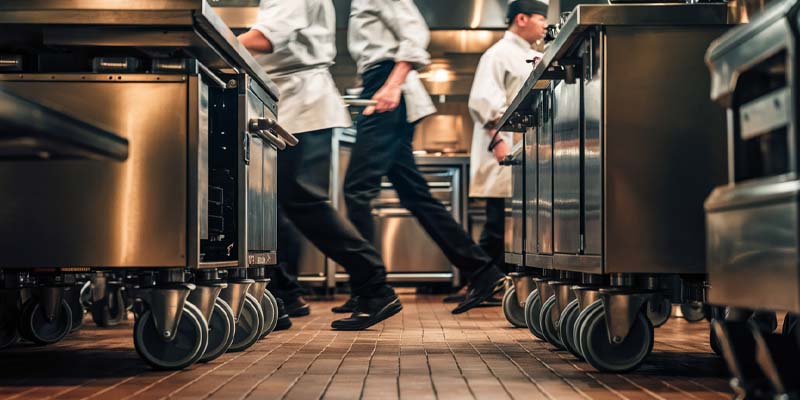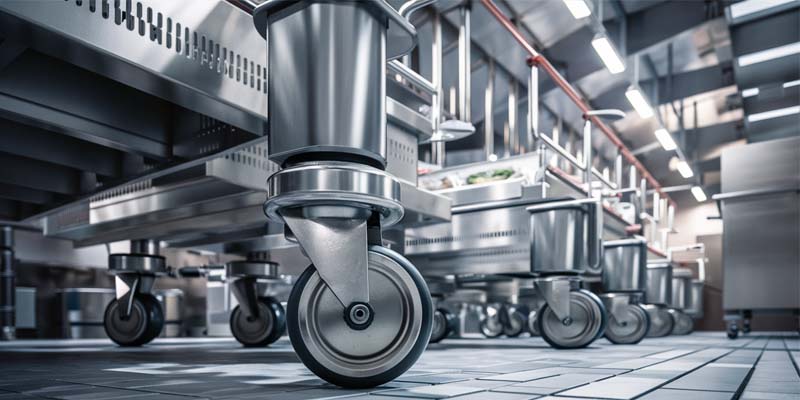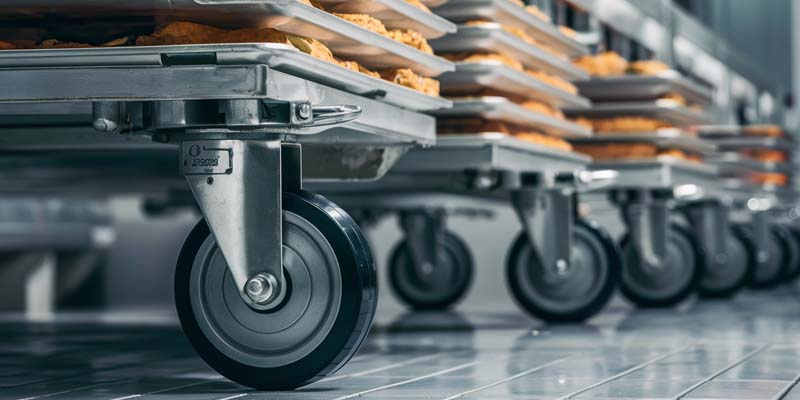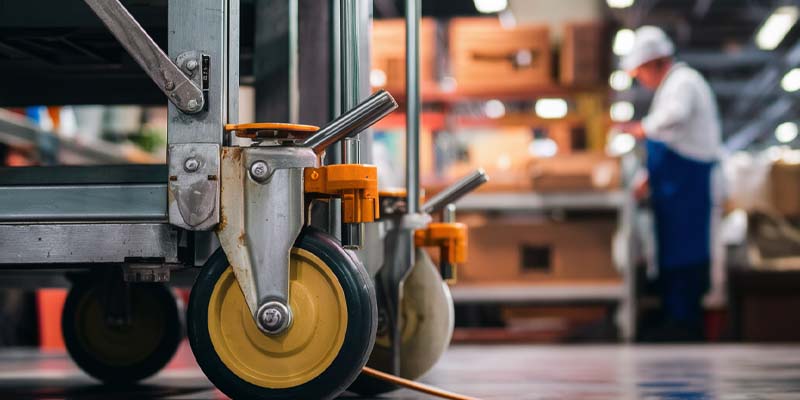Improving Safety in Food Service with Specialized Steel Casters
Aug 13th 2024
Safety is crucial in the fast-paced and demanding world of food service. Establishing a safe environment for the well-being of both employees and customers is a top priority, and this extends to every aspect of food preparation and delivery. One crucial yet often overlooked component that significantly impacts safety in food service environments is the type of casters used on equipment and carts. Specialized steel casters, designed specifically for the rigorous demands of food processing facilities and commercial kitchens, help maintain a safe and efficient operation. This article highlights the significance of safety in the food service industry, explores the role of specialized steel casters, and provides comprehensive insights into their benefits and applications.
The Importance of Food Safety in the Food Processing Industry

Food safety regulations are stringent and essential to ensure the health and safety of consumers. Regulatory bodies like the Food and Drug Administration (FDA) and the United States Department of Agriculture (USDA) set strict guidelines that food processing industry companies must adhere to. These regulations encompass everything from hygiene practices to equipment standards, ensuring that the food reaching consumers is safe to eat.
A food safety specialist ensures compliance with these regulations by implementing and monitoring food safety protocols, organizing regular inspections, and training staff on best practices. Their expertise helps prevent contamination and foodborne illnesses, safeguarding public health. However, even with stringent protocols, challenges in maintaining food safety persist, especially in food processing facilities.
Overview of Food Safety Regulations
Food safety regulations are designed to ensure food products are safe for consumption. These regulations cover a wide range of practices, like proper handling of food, storage, and preparation. In the United States, the FDA and USDA enforce these regulations, setting standards that food processing industry companies must follow. Compliance with these regulations is not optional, as negligence can result in severe penalties, including fines and shutdowns.
The Role of a Food Safety Specialist in Ensuring Compliance
A food safety specialist in the food processing industry is tasked with implementing food safety protocols, conducting regular inspections, and ensuring compliance with all relevant regulations. They work closely with staff to educate them on proper food handling techniques and the significance of keeping their work environment clean and safe. By doing so, they help minimize the risk of contamination and foodborne illnesses.
Challenges in Food Processing Facilities
Food processing facilities face numerous safety challenges that can jeopardize worker safety and product quality. One of the primary concerns is the risk of contamination. High foot traffic, constant movement of equipment, and the handling of various raw materials can create an environment prone to contamination if not managed correctly.
Common Safety Challenges
Contamination in the food processing industry can occur at any stage of the food processing chain - right from the arrival of raw materials to the final packaging of finished products. Cross-contamination, where bacteria or allergens from one food product are transferred to another, is a particular concern. Additionally, the physical safety of workers is a major issue, with injuries from slips, trips, and falls being common in food processing facilities.
Importance of Kitchen Efficiency in Commercial Kitchens
Like in any other industry, efficiency is crucial in commercial kitchens. The ability to quickly and safely move equipment and food items is essential for maintaining a smooth workflow. Inefficient kitchens can lead to delays, increased waste, and higher operational costs. Moreover, a lack of efficiency can compromise food safety, as delays in preparation and storage can increase the risk of contamination.
The Role of Industrial Casters in Food Safety

Industrial casters are essential components that enhance safety and efficiency in food processing facilities. These casters allow for the smooth and effortless movement of equipment, minimizing the risk of accidents and injuries. Industrial casters contribute to a safer working environment by providing stability and mobility.
How Industrial Casters Improve Safety
First, industrial casters allow for the easy movement of heavy equipment, reducing the risk of strains and injuries among workers. Second, they provide stability, ensuring that equipment remains secure during use. This is particularly important in environments where equipment is frequently moved or adjusted. Finally, casters can be equipped with locks to prevent unwanted movement, further enhancing safety.
Benefits of Using Specialized Steel Casters
Specialized steel casters offer numerous benefits in food service settings. Their robust construction ensures they withstand the heavy demands of commercial kitchens and the food processing industry. Steel casters, especially those made from stainless steel, are resistant to corrosion, making them ideal for environments where hygiene is critical. These casters also facilitate easy cleaning, further reducing the risk of contamination.
Types of Steel Casters for Food Service
Several types of steel casters are suitable for food service applications, each offering unique advantages.
Heavy-Duty Steel Casters
Heavy-duty steel casters are designed to support substantial weight loads. They are ideal for large equipment and machinery in food processing facilities, providing stability and ease of movement. These casters are built to last, ensuring that even the most demanding operations can be conducted safely and efficiently. The robust design of heavy-duty steel casters means they can handle the continuous wear and tear of a busy food processing facility without compromising performance.
Steel Wheel Casters
Steel wheel casters are known for their durability and strength. They can withstand grinding conditions and are suitable for use in environments where floors may be uneven or have obstacles. Their robust design ensures longevity, making them a cost-effective choice for food processing industry companies. These casters are perfect for environments that require reliable and long-lasting mobility solutions.
Stainless Steel Casters
Stainless steel casters are the gold standard for food service applications. Their resistance to rust and corrosion makes them perfect for environments that require frequent cleaning to maintain hygiene. These casters are easy to clean, maintain, and use for extended periods. Stainless steel casters are particularly well-suited to food processing facilities where frequent cleaning and exposure to moisture are common.
Benefits of Using Steel Casters in Food Processing Industry Machinery

The advantages of using steel casters in food processing industry machinery are manifold.
Durability and Longevity
Steel casters are exceptionally durable and capable of withstanding the rigors of daily use in harsh environments. Their longevity means they do not need to be replaced frequently, resulting in cost savings for food processing facilities. The robust nature of steel casters ensures they can handle the heavy loads and constant movement typical in a food processing environment.
Easy Maintenance and Cleaning
Maintaining and cleaning steel casters is straightforward and necessary in the food processing industry, where hygiene cannot be compromised. Stainless steel casters, in particular, are corrosion-resistant and can be sanitized effectively, ensuring compliance with food safety standards. Regular maintenance of these casters involves simple cleaning procedures, making them a practical choice for busy facilities.
Choosing the Right Steel Casters for Your Food Processing Facility
Selecting the appropriate casters for your food processing facility involves considering several factors.
Factors to Consider When Selecting Casters
When choosing casters, consider the weight load they need to support, the type of flooring in your facility, and the environment they will be used in. Heavy-duty steel casters are suitable for substantial equipment, while steel wheel casters are ideal for uneven surfaces. Stainless steel casters are recommended for environments where hygiene is a top priority. In addition, consider the ease of maintenance and the specific requirements of your food processing operations.
Recommendations for Different Applications
Lightweight yet sturdy casters are ideal for food service carts on wheels that need to be moved frequently. Heavy-duty casters provide the necessary support and stability for stationary equipment that occasionally needs to be relocated. In wet or corrosive environments, stainless steel casters are the best choice to ensure longevity and maintain hygiene standards. Each type of caster offers unique benefits, making it essential to match the caster type to the specific needs of your facility.
Maintaining and Replacing Steel Casters

Proper maintenance of steel casters is essential to ensure their continued functionality and safety.
Tips for Proper Maintenance
Regularly inspect casters for signs of wear and tear and clean them thoroughly to remove dirt and grime, which can impede their performance. Lubricate parts that move to ensure smooth operation and check for any loose bolts or fittings. Regular maintenance ensures casters remain in optimal condition, minimizing the risk of accidents and prolonging their lifespan.
When and How to Replace Casters
Casters should be replaced if they show signs of significant wear, such as flat spots on wheels or difficulty in movement. Replacing casters involves removing the old ones and fitting new ones securely. Ensure that the replacement casters are of the same type and specifications to maintain the equipment's stability and performance. Regularly reviewing the condition of casters and replacing them when necessary helps maintain the safety and efficiency of your operations.
Improve Safety and Efficiency with Atlanta Caster
Specialized steel casters are invaluable in improving safety and efficiency in food service environments. Their durability, ease of maintenance, and suitability for various applications make them a vital component in the food processing industry. By investing in the right casters, food processing facilities can enhance kitchen efficiency, reduce the risk of accidents, and ensure compliance with stringent food safety regulations.
Food processing companies seeking to optimize their operations should explore specialized steel casters from Atlanta Caster. Our casters contribute to a safer working environment and enhance the overall performance of food processing industry machinery.
To explore a range of specialized steel casters and find the best fit for your needs, contact Atlanta Caster and discover how these essential components can transform your food service operations.




 Email US
Email US
 Hours
Hours
 Visit Our Showroom
Visit Our Showroom




